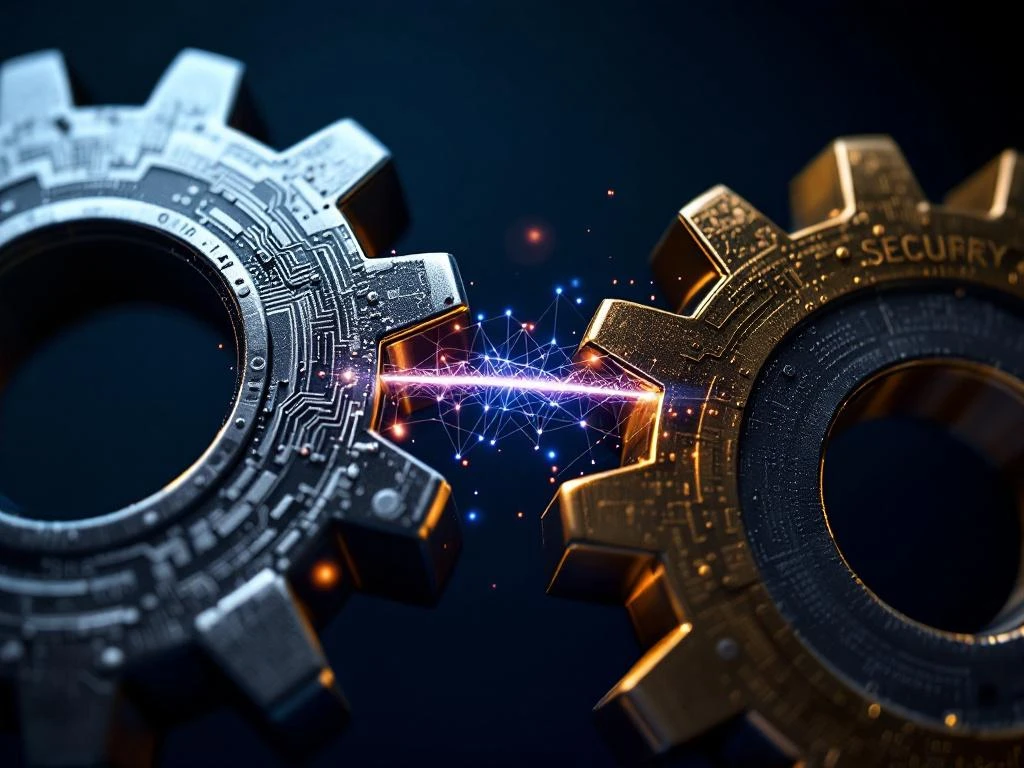

-
UK: +44 203 8876 770
US: 315 508 6500 - cybersecurity@thisisiceberg.com
-
8 Devonshire Square, London, EC2M 4YJ

The legal profession faces an unprecedented challenge. Artificial intelligence has moved from experimental technology to business-critical infrastructure, creating complex compliance requirements that traditional legal training never anticipated. Most legal teams find themselves scrambling to understand AI systems they’re tasked with governing, often lacking the technical foundation needed for effective oversight.
This gap between legal expertise and technical reality puts organisations at serious risk. You need legal professionals who understand both the law and the technology itself. This means hiring AI counsel who combine deep technical knowledge with legal acumen, rather than relying solely on regulatory experts who lack hands-on AI experience.
This guide explores why technical expertise matters for AI legal roles, how to identify the right blend of skills, and common mistakes that derail AI counsel recruitment efforts.
Traditional legal education focuses on precedent, regulation, and compliance frameworks. While these skills remain valuable, they create significant blind spots when applied to AI governance without technical understanding.
Most lawyers approach AI regulation like any other compliance challenge. They read the guidelines, interpret the requirements, and create policies based on legal text. But AI systems don’t operate according to legal frameworks. They function through algorithms, data processing, and machine learning models that behave in ways legal documents rarely capture accurately.
Consider data privacy compliance in AI systems. A traditional lawyer might focus on consent mechanisms and data retention policies. However, they often miss critical technical issues:
These aren’t legal concepts you can learn from regulatory text.
The problem compounds when lawyers must negotiate AI contracts or assess vendor compliance. Without understanding how machine learning actually works, they can’t evaluate whether proposed technical safeguards will achieve their intended legal objectives. They rely on vendor assurances about capabilities they can’t independently verify.
Risk assessment becomes particularly problematic. Traditional legal risk frameworks focus on known regulatory violations and established liability patterns. AI systems create novel risks that don’t fit existing categories. A lawyer without technical background struggles to identify potential failure modes or assess the likelihood of different AI-related incidents.
AI counsel combines legal expertise with genuine technical understanding of artificial intelligence systems. This isn’t about lawyers who’ve read AI whitepapers or attended technology briefings. It means legal professionals who understand algorithms, data science principles, and software development practices well enough to make informed legal decisions.
The technical knowledge required goes beyond surface-level familiarity. Effective AI counsel understands how machine learning models are trained, deployed, and monitored. They know the difference between supervised and unsupervised learning, understand bias sources in training data, and grasp the technical limitations of different AI approaches.
| Traditional Legal Counsel | AI Counsel |
|---|---|
| Focuses on regulatory text interpretation | Evaluates technical implementation feasibility |
| Relies on vendor technical assurances | Independently verifies technical capabilities |
| Creates policies based on legal frameworks | Designs compliance for real AI system constraints |
| Reactive problem-solving approach | Proactive guidance during system design |
This technical foundation enables fundamentally different legal analysis. When reviewing an AI vendor contract, AI counsel can evaluate whether proposed audit mechanisms actually provide meaningful oversight. They understand which technical specifications matter for compliance and which are marketing language without substance.
AI counsel also brings practical implementation perspective to legal requirements. They know which compliance measures are technically feasible and which create impossible burdens. This prevents the common problem of legal teams creating policies that sound good on paper but can’t be implemented in real AI systems.
Most importantly, AI counsel can bridge communication gaps between legal and technical teams. They translate legal requirements into technical specifications and explain technical constraints in legal terms. This prevents the misunderstandings that often derail AI compliance efforts.
Technical understanding fundamentally changes how legal professionals approach AI-related decisions. Instead of relying on abstract policy frameworks, they can evaluate specific technical implementations and their legal implications.
Contract negotiation becomes far more effective when lawyers understand the technology being contracted. AI counsel can identify which service level agreements actually matter for legal compliance and which vendor commitments are technically meaningless. They know which audit rights provide real oversight and which give only the illusion of control.
Risk assessment improves dramatically with technical knowledge. AI counsel can identify potential failure modes that purely regulatory experts miss:
Compliance strategies become more practical and effective. Instead of creating policies that assume perfect technical implementation, AI counsel designs compliance frameworks that account for real-world technical constraints. They build monitoring and oversight mechanisms that actually work with how AI systems operate.
Technical knowledge also enables proactive legal guidance rather than reactive problem-solving. AI counsel can identify legal issues during system design phases when solutions are still feasible and cost-effective. They prevent compliance problems rather than just responding to them after they occur.
The ability to evaluate technical evidence becomes particularly valuable in disputes or investigations. AI counsel can assess whether technical explanations from vendors or internal teams align with legal requirements. They can identify when technical complexity is being used to obscure legal compliance failures.
Looking for information about the challenges of hiring AI counsel? You're not alone - many of our clients struggle to find legal professionals who truly understand both law and technology. Which situation best describes where you are right now?
Recruiting effective AI counsel requires a fundamentally different approach than traditional legal hiring. You need to assess both legal competency and genuine technical understanding, which demands specialised evaluation methods.
Start by defining the specific technical knowledge your AI counsel needs. Different organisations require different levels of technical depth:
Map your AI implementation to the technical knowledge required for effective legal oversight.
Develop interview techniques that actually test technical understanding rather than just familiarity with AI terminology. Ask candidates to explain how specific AI systems work and what legal risks different technical approaches create. Focus on practical application rather than theoretical knowledge.
Consider candidates from non-traditional backgrounds. Some of the best AI counsel combine legal training with previous technical experience in software development, data science, or AI research. Others have developed technical expertise through hands-on work with AI systems in legal practice.
Structure interviews to include both legal and technical assessments. Have technical team members evaluate candidates’ understanding of AI systems alongside traditional legal competency reviews. This prevents hiring lawyers who sound technical but lack practical understanding.
Look for evidence of continuous learning and adaptation. AI technology evolves rapidly, so effective AI counsel must stay current with both legal and technical developments. Evaluate candidates’ ability to learn new technical concepts and apply them to legal analysis.
When working with specialised recruitment firms, ensure they understand both the legal and technical requirements. Many legal recruiters lack the technical knowledge needed to properly evaluate candidates with hybrid skill sets. Partner with recruiters who have experience in both legal and technology hiring.
Organisations frequently make predictable errors when hiring AI legal professionals. These mistakes stem from misunderstanding what makes AI counsel effective and applying traditional legal hiring approaches to roles that require hybrid expertise.
The most common hiring mistakes include:
The combination of legal expertise and technical AI knowledge creates a unique professional profile that requires specialised recruitment approaches. Success depends on understanding both the legal and technical dimensions of these roles and developing evaluation methods that assess genuine competency in both areas.
Finding the right AI counsel transforms your organisation’s ability to navigate AI governance challenges effectively. Rather than reactive compliance management, you gain proactive legal guidance that enables AI innovation while managing risk appropriately. When you’re ready to build your AI legal team with professionals who truly understand both law and technology, we specialise in connecting organisations with elite legal professionals who combine deep technical AI knowledge with proven legal expertise.
If you are interested in learning more, reach out to our team of experts today.













